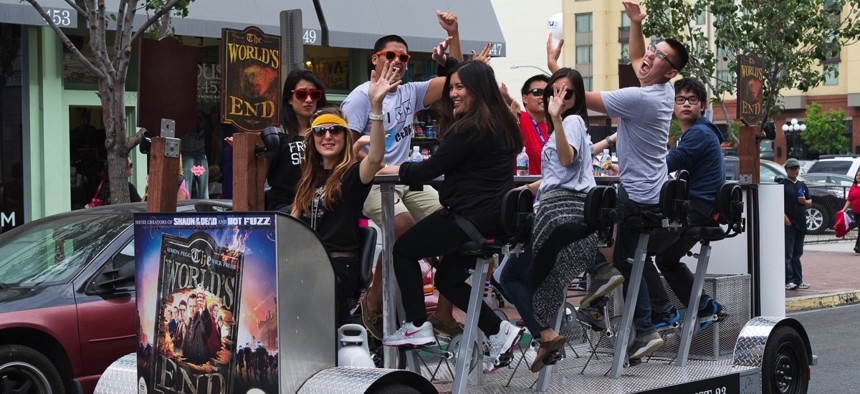Popular ‘Pedal Pubs’ Spark Complaints and Regulatory Questions

Beer bikes have operated in San Diego as early as 2013. Betto Rodrigues / Shutterstock.com

Connecting state and local government leaders
Bikes powered by beer drinkers? What could go wrong?
What happens when cyclists armed with squirt guns and water balloons unwittingly engage a mobile “pedal pub” seating six off-duty police officers? Six arrests, that’s what.
Superfans of the satirical Facebook page “ I Hate the Pedal Pub ” are suspected of using social media to plan a recent water raid against three 16-seat beer bikes.
Drivers for PedalPub Twin Cities were on high alert however, having caught wind of the Facebook chatter, according to Minnesota Public Radio , and their Burnsville police passengers detained the aqua assailants until on-duty Minneapolis officers arrived.
While the incident might seem harmless, “it is still considered assault” as the Facebook page noted later that evening. Now, five men face misdemeanor charges.
But the incident in Minnesota raises questions about the popularity of pedal pubs—perceived by some city dwellers as suburban blights on bar-rich urban neighborhoods—and in the regulatory space, whether rules for operations are adequate.
“The city made the decision to license the industry, and they put in place a number of regulations we are expected to follow,” manager Lisa Staplin told the Star Tribune . “If people are concerned about noise, why not go after the guys on Harleys we hear screaming up and down?”
But noise isn’t the only complaint. “I Hate the Pedal Pub” creator Matt Peterson, a northeast Minneapolis resident, complained to the Star Tribune about how pedal pub passengers sometimes litter, vomit and urinate in residential neighborhoods.
Those were all concerns voiced when Minneapolis first regulated pedal pubs in 2013, requiring tours begin and end on private property providing off-street parking and restrooms. The city’s move prompted the companies to forge partnerships with local bars and restaurants for parking and bathroom use, but problems have persisted.
Minnesota legalized multi-passenger bicycles for alcohol consumption in 2009, with Minneapolis limiting that to beer and wine. Pedal pubs can operate until 10 p.m. though they’re barred from downtown between 3:30 p.m. and 5 p.m.
Costs for annual company and driver licensing, as well as vehicle inspections, are the same as those for pedicabs in the city with $2 million of insurance required. A $500 administrative fine can be levied against companies for violating Minneapolis’ pedal pub ordinance, and that doubles for subsequent offenses up to $2,000.
Mobile Pubs on the Rise
California Senate lawmakers approved a pedal-powered quadricycle bill last week Tuesday, four days before the Minneapolis fiasco. The legislation leaves it up to cities to decide if alcohol is allowed on board. Beer bike speeds would be limited to 15 m.p.h., and cities would be required to establish safety regulations before pedal pubs are considered road worthy.
The European-born bikes are already catching on in the Golden State and can be found in Sacramento and San Diego . California's Assembly has yet to vote on the bill.
In North Carolina, Raleigh-based Trolley Pub owner Kai Kaapro has been on a year-long campaign to get his 14-person carts on the streets of Wilmington before the summer, according to WECT-TV. He’s gone so far as to craft a draft ordinance and has assured City Council members that obnoxious and indecent behavior is “very, very rare” and drunk passengers are cut off.
"I'd kinda just like to see a presentation and see what it's all about,” Councilman Charlie Rivenbark told the television station. “It may not be something repugnant that we can't get behind and enjoy. It'd be another attraction downtown.”
Kaapro’s original operation in Tucson, Arizona, shut down, but he’s considering expanding the one in Raleigh, North Carolina . He also has his sights set on Albuquerque, New Mexico , and the Virgin Islands, having recently launched operations in the cities of Houston, Texas, and Madison, Wisconsin, plus Arlington County, Virginia.
Virginia Del. Patrick Hope attempted to get a bill passed in 2014, allowing pub pedalers to drink as they go, but the broadly-written legislation died because it would’ve also included limos, buses and boats. As it stands, pedal pub passengers in Virginia can only drink at bar stopping points—an annoyance to taxi cabs when they take up parking spaces.
Virginia’s Department of Alcoholic Beverage Control prevented Kaapro’s operation from being bring-your-own-beer, which somewhat tempered Arlington County board members’ opposition to the endeavor. A police review found it otherwise legal , according to ARLnow.com. But the Trolley Pub’s impact on traffic in congested parts of the densely populated county, just outside Washington, D.C., remains a sticking point.
Kaapro remains undeterred.
"As people learn more about the business they tend to warm up to the idea, especially when it comes to the economic benefits of it and the fact that our operations are relatively benign," he told WECT-TV.

NEXT STORY: City boosts data center security with virtualized network platform





